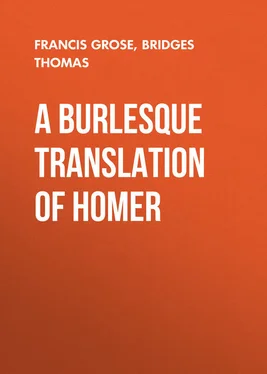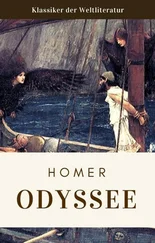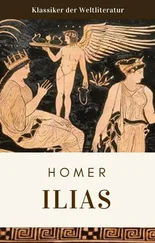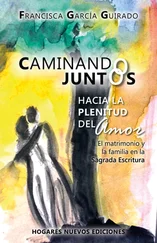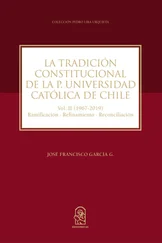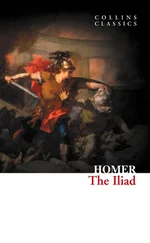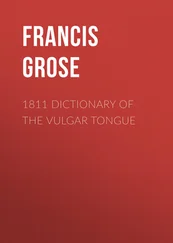Francis Grose - A Burlesque Translation of Homer
Здесь есть возможность читать онлайн «Francis Grose - A Burlesque Translation of Homer» — ознакомительный отрывок электронной книги совершенно бесплатно, а после прочтения отрывка купить полную версию. В некоторых случаях можно слушать аудио, скачать через торрент в формате fb2 и присутствует краткое содержание. Жанр: foreign_antique, foreign_prose, на английском языке. Описание произведения, (предисловие) а так же отзывы посетителей доступны на портале библиотеки ЛибКат.
- Название:A Burlesque Translation of Homer
- Автор:
- Жанр:
- Год:неизвестен
- ISBN:нет данных
- Рейтинг книги:5 / 5. Голосов: 1
-
Избранное:Добавить в избранное
- Отзывы:
-
Ваша оценка:
- 100
- 1
- 2
- 3
- 4
- 5
A Burlesque Translation of Homer: краткое содержание, описание и аннотация
Предлагаем к чтению аннотацию, описание, краткое содержание или предисловие (зависит от того, что написал сам автор книги «A Burlesque Translation of Homer»). Если вы не нашли необходимую информацию о книге — напишите в комментариях, мы постараемся отыскать её.
A Burlesque Translation of Homer — читать онлайн ознакомительный отрывок
Ниже представлен текст книги, разбитый по страницам. Система сохранения места последней прочитанной страницы, позволяет с удобством читать онлайн бесплатно книгу «A Burlesque Translation of Homer», без необходимости каждый раз заново искать на чём Вы остановились. Поставьте закладку, и сможете в любой момент перейти на страницу, на которой закончили чтение.
Интервал:
Закладка:
Juno, with face as broad as platter,
Soon found she had mista'en the master;
She relish'd not this surly dish,
So sat her down as mute as fish:
At which the guests were so confounded,
That all their mirth was well nigh drowned
Their knives and forks they every one
Before their greasy plates laid down;
Each mouth was ready cock'd, to beg
Leave to depart, and make a leg;
When Juno's son, ycleped Vulcan,
A special fellow at a full can,
Who was of handicrafts the top,
And kept a noted blacksmith's shop,
Where he made nets, steel caps, and thunder,
And finish'd potlids to a wonder;
He, finding things were going wrong,
And that they'd fall by th' ears ere long,
Starts up, and in a merry strain
Hammer'd a speech from his own brain.
Quoth he, What pity 'tis that we,
Who should know nought but jollity,
Should scold and squabble, brawl and wrangle,
And about mortal scoundrels jangle!
In peace put we the can about,
Let Englishmen in drink fall out,
And, at the meetings of the trade,
Fight when the reck'ning should be paid.
Mother, you know not what you're doing;
To CALLOT thus will be your ruin;
He'll some time, in a dev'lish fury,
Do you some mischief, I'll assure you:
Yet, I'll lay sixpence to a farthing,
He'll kiss you, if you ask his pardon.
This said, a swingeing bowl he takes,
And drank it off for both their sakes;
Then with a caper fill'd another,
Which he presented to his mother:
Not courtier-like I hand this bowl:
But take it from an honest soul,
That means and thinks whate'er he says;
It won't be so in future days:
Here, drink Jove's health, and own his sway:
You know all women must obey.
When once my father's in a passion,
He's dev'lish cross, hear my relation:
In your good cause I felt his twist,
My leg he seiz'd in his strong wrist;
In vain it was with him to grapple,
He grasp'd me as you would an apple;
And from his mutton-fist when hurl'd,
For three long days and nights I twirl'd;
At last upon the earth fell squash,
My legs were broken all to smash:
'Tis true, they're set, as you may see,
But most folks think damn'd awkwardly.
He then the bowl, with clownish grace,
Fill'd round, and wip'd his sooty face,
Then limp'd away into his place.
This cur'd them all from being dull,
And made 'em laugh their bellies full:
Once more their teeth to work they set,
And laid about 'em till they sweat,
Drinking, like well-fed aldermen,
A bumper every now and then,
Which they took care their guts to put in
Whilst t' other slice of beef was cutting;
For they, like cits, allow'd no crime
So great as that of losing time,
At home, abroad, or any meeting
Where the debate must end in eating.
Now they were in for't, all day long
They booz'd about, and had a song:
The fiddlers scrap'd both flat and sharp;
Apollo thrum'd the old Welch harp:
Nine ballad-singers from the street
Were fetch'd, with voices all so sweet,
Compar'd with them, Mansoli's squeaking
Would seem like rusty hinges creaking.
At sun-set 2 2 Homer makes the gods go home at sun-set; I wish he could make all country justices and parsons do the same.
, with a heavy head,
Each drunkard reel'd him home to bed,
Vulcan, who was the royal coiner,
Besides both carpenter and joiner,
Had built for every god a house,
And scorn'd to take a single sous.
Now night came on, the thund'rer led
His helpmate to her wicker bed;
There they agreed, and where's the wonder?
His sceptre rais'd, she soon knock'd under.
THE SECOND BOOK OF HOMER'S ILIAD
ARGUMENT
Jove, or by fame he much bely'd is,
Sends off a Dream to hum Atrides:
His conscience telling him it meet is
To make his promise good to Thetis;
Gave it commission as it went,
To tell the cull by whom 'twas sent;
And bid it fill his head top full,
Of taking Troy, and cock and bull.
The Vision goes as it was bid,
And fairly turns the poor man's head,
Who eagerly began to stare
At castles building in the air,
And fancy'd, as the work went on,
He heard Troy's walls come tumbling down.
But ere he starts, he has an eye
The metal of his rogues to try:
He tells the chiefs, when he proposes
That homeward all shall point their noses,
They must take care, when he had sped,
To come and knock it all o' th' head.
The plot succeeds; they're glad to go;
But sly Ulysses answer'd, No;
Then drove his broomstick with a thwack
Upon Thersites' huckle back;
Check'd other scoundrels with a frown,
And knock'd the sauciest rascals down;
Proving, that at improper times
To speak the truth's the worst of crimes.
Th' assembly met; old Nestor preaches,
And all the chiefs, like schoolboys, teaches
Orders each diff'rent shire to fix
A rendezvous, nor longer mix,
But with their own bluff captains stay,
Whether they fight or run away:
And whilst thus gather'd in a cluster,
They nick the time, and make a muster.
HOMER'S ILIAD
The watch past twelve o'clock were roaring,
And citizens in bed were snoring,
And all the gods of each degree
Were snoring hard for company,
Whilst Jove, whose mind could get no ease,
Perplex'd with cares as well as fleas
(For cares he in his bosom carried,
As every creature must that's married),
Was plotting, since he had begun,
How he might honour Thetis' son;
And scratch'd, and scratch'd, but yet he could
Not find a method for his blood
To keep his word. At last he caught,
By scratching hard, a lucky thought
(And 'faith, I think, 'twas no bad scheme);
To send the Grecian chief a Dream,
Made of a Cloud, on which he put
A coat and waistcoat, ready cut
Out of the self-same kind of stuff,
But yet it suited well enough
To give it shape: Now, Mr. Dream,
Take care you keep the shape you seem,
Says Jove; then do directly go
To Agamemnon's tent below:
Tell him to arm his ragged knaves
With cudgels, spits, and quarter-staves,
Then instantly their time employ
To rattle down the walls of Troy.
Tell him, in this, Miss Destiny
And all the heav'nly crew agree:
For Juno has made such a riot,
The gods do aught to keep her quiet.
Away goes Dream upon the wing,
And stands before the snoring king:
Grave Nestor's coat and figure took,
As old as he, as wise his look,
Rubs the cull's noddle with his wings,
And, full of guile, thus small he sings:
Monarch, how canst thou sleeping lie,
When thou hast other fish to fry?
O Atreus' son, thou mighty warrior,
Whose father was a skilful farrier,
Hast thou no thought about decorum,
Who art the very head o'th' quorum?
I shame myself to think I'm catching
Thee fast asleep, instead of watching.
Is not all Greece pinn'd on thy lap?
Rise, and for once postpone thy nap,
Lest by some rogue it should be said,
The chief of chiefs went drunk to bed:
For Jove, by whom you are respected,
Says your affairs sh'an't be neglected;
So sends you word he now is poring
On your concerns, whilst you are snoring:
He bids thee arm thy ragged knaves
With cudgels, spits, and quarter-staves,
Then instantly thy time employ
To rattle down the walls of Troy:
To this, he adds, Miss Destiny
And all the heav'nly crew agree:
For Juno has made such a riot,
The gods do aught to keep her quiet.
Then nothing more this Nothing says,
But turn'd about, and went his ways.
Up starts the king, and with his nail
Scratch'd both his head, and back, and tail;
And all the while his fancy's tickl'd,
To think how Troy would soon be pickl'd.
A silly goose! he little knew
What surly Jove resolv'd to do;
What shoals of sturdy knaves must tumble
Before they could the Trojans humble.
Down on an ancient chopping-block
This mighty warrior clapp'd his dock
(The block, worn out with chopping meat,
Now made the chief a rare strong seat):
Then don'd his shirt with Holland cuff,
For, Frenchman-like, he lay in buff;
Next o'er his greasy doublet threw
A thread-bare coat that once was blue,
But dirt and time had chang'd its hue;
Slipp'd on his shoes, but lately cobbled,
And to the board of council hobbled;
But took his sword with brazen hilt,
And wooden sceptre finely gilt.
Now, Madam Morn popp'd up her face,
And told 'em day came on apace;
When Agamemnon's beadles rouse
The Greeks to hear this joyful news.
He long'd, like breeding wife, it seems,
To tell his tickling, pleasing dreams.
I' th' int'rim, trotting to the fleet,
Old Nestor there he chanc'd to meet,
Whose tent he borrows for that morn,
To make a council-chamber on;
And reason good he had, I ween,
It kept his own apartment clean.
Интервал:
Закладка:
Похожие книги на «A Burlesque Translation of Homer»
Представляем Вашему вниманию похожие книги на «A Burlesque Translation of Homer» списком для выбора. Мы отобрали схожую по названию и смыслу литературу в надежде предоставить читателям больше вариантов отыскать новые, интересные, ещё непрочитанные произведения.
Обсуждение, отзывы о книге «A Burlesque Translation of Homer» и просто собственные мнения читателей. Оставьте ваши комментарии, напишите, что Вы думаете о произведении, его смысле или главных героях. Укажите что конкретно понравилось, а что нет, и почему Вы так считаете.
